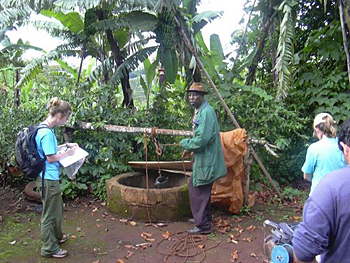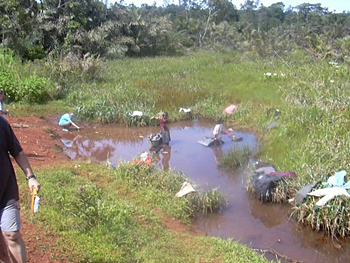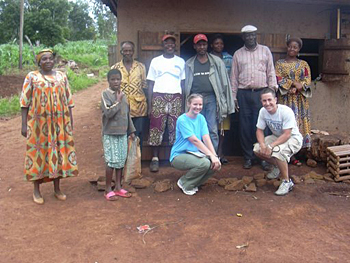Last summer, four engineering undergraduates, along with faculty adviser Steven K. Dentel, traveled to the village of Bakang, in the western province of Cameroon, to assist a community relying on turbid creeks and unsafe open wells that have significant levels of bacteria. There is no electricity in the village and the women and children carry the water as a burdensome, daily routine, Dentel said. The UD group assessed the community's needs for safe drinking water, made some immediate improvements, and will return to Bakang during Winter Session to implement the plan they have been developing for a long-term solution.
According to Dentel, a professor of civil and environmental engineering, “this exemplifies the global challenges that UD engineers can deal with, and, with their problem-solving skills, develop solutions that are culturally and environmentally sustainable.”
The village of Bakang is remote, at a mile's elevation and just off the equator. Passports, visas, immunizations, scheduling and equipment transport were carefully arranged. Even with these advance preparations, the poles for surveying and groundwater exploration had to be repackaged at the airport, requiring much of the engineers' reserve supply of duct tape. Plans were also revised once arriving in Douala, Cameroon, where the vehicle for the five-hour trip to Bakang could not fit all of the equipment. Arrangements were made to send it to the worksite by bus, and the team needed to repair some of the electrical equipment once it arrived.
“This group was great at advance planning, but also immediate problem solving,” Dentel said. “Without an electrical engineer, we still managed to analyze and repair our resistivity equipment.” His intrepid team included Sarah O'Neill, a mechanical engineering junior from Sterling, Va.; Samantha Sagett, a junior environmental engineering major from Bear, Del.; Bernard Fortunato, a civil engineering senior from Stony Brook, N.Y.; and Julie Trick, a senior civil engineering major from Dayton, Ohio. The team also was assisted by Tony Rana, a professional hydrogeologist.
Students took the initiative in starting an EWB chapter at UD, Dentel said. Students had been clamoring for a chapter, he said, when he decided to volunteer as faculty adviser. “Beyond the group that went to Bakang, we had a strong support group of students tracking our progress,” he said.
O'Neill, one of the students most interested, said the first step was to look at other chapters to see how they got started and how they found projects. When the UD group queried the chapter at Johns Hopkins, they found that that group had projects to spare. With the help of Olivia Mukam, a student from Cameroon at Johns Hopkins, the UD group found out about the potable water needs of Bakang.
After research and conference calls to find out more about the area and its needs, and filling out a 14-page application, the UD group got approval from EWB national headquarters.“This first trip was site assessment,” Sagett explained. "We mapped the region using GPS equipment and doing survey work. We tried to find where the water table was and helped create a local water committee to make the project sustainable. The water committee will handle the politics of water in the community and will make sure that the system is maintained. We also interviewed the local people to find out their needs," she said, explaining that they used interpreters who could translate English into French and then into the tribal language.
“The people were very supportive,” Fortunato said. “Sometimes they would even cheer for us--it was like we were their soccer stars or something.”
Dentel added that the UD group worked hard to make sure half of the members of the water committee were women. “After all, the women and children are the ones who spend one to two hours several times a day going to get water and carrying it back to the village,” he said.
The area the group is helping consists of dispersed family compounds with modest plots used for subsistence farming. The mayor suggested the UD group look into building a well in one central location with a storage tower and a solar-powered pumping station that could send water closer to the compounds. The first step was to survey the area, decide where to put the well, and verify the need.
“When we surveyed the area and tested the water we found bacteria and impurities in all the streams and hand-dug wells, “ Sagett said.
A pleasant surprise, Dentel added, was the discovery of a drilled well in the area that was just not working. “By getting that well repaired, we provided an immediate and unexpected improvement--but it is only the beginning. Now we know what we need for the overall community, and we can plan how to do it. Our biggest task now will be raising funds to support our next visit.”

“Getting safe drinking water to people everywhere is a huge problem,” O'Neill said. “There are over 1 billion people who do not have access to it--that's one out of six people.”
Sagett concluded, “I feel incredibly fortunate to be a part of this. UD has a great engineering program, and Engineers Without Borders lets us use our skills to make a real difference.”
UD's chapter of Engineers Without Borders is seeking more members and students do not have to be engineering majors to join. For more information, contact O'Neill at [ewb.udel@gmail.com] or visit [http://copland.udel.edu/stu-org/ewb], which includes a blog posted while the team was in Cameroon.
General meetings are held at 7 p.m., Thursdays, in 223 Gore Hall.
Photos courtesy of the UD chapter of Engineers Without Borders



